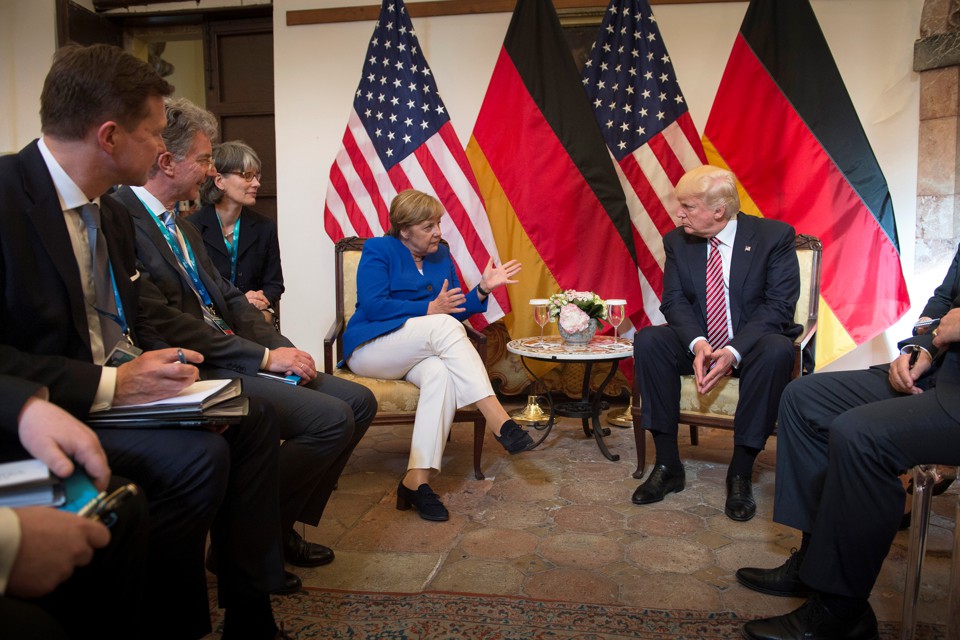
BPA Agency via Reuters
CFR-Controlled MSM Reports That ‘Trump’s Trip Was a Catastrophe for U.S.-Europe Relations’
Angela Merkel has served formal notice that she will lead the German wandering away from the American alliance.
DAVID FRUM
The Atlantic
Historians have long debated whether the note represented a genuine offer or a cynical ploy. (Current consensus: ploy.) There’s no debate about what happened next. Determined to anchor Germany securely in the Western camp of nations, German Chancellor Konrad Adenauer rebuffed the “Stalin note.” West Germany would enter NATO in 1955, build the European Union, and develop as an Atlanticist liberal democracy.
The Soviets did not quit, however. Again and again through the Cold War they would probe for ways to split Germany from the West, and especially from the United States. They probably came closest in the early 1980s, when millions of Germans marched in the streets against NATO nuclear missile deployments. (The 1983 song, “99 Luftballons” is probably now the most enduring memento of that dramatic moment.)
Since then, Germany has deferred less and less to the United States—and walked more and more its own path. Germans cheered candidate Obama in 2008, but German-U.S. relations if anything sank even lower under President Obama than under President Bush. Merkel ignored Obama’s pleas to reflate the German economy after the financial crisis of 2008 and the euro crisis of 2010. The Snowden revelations—including exaggerated claims that the United States had tapped Merkel’s ubiquitous personal cellphone—poisoned the mood even more deeply. In June 2014, Germany took the unprecedented step of expelling the senior U.S. intelligence officer in Berlin, even announcing the action over Twitter. (Never mind that it soon emerged that German intelligence had itself scooped up a Hillary Clinton phone call.) Here’s a link to an RT story gleefully—but accurately —noting that the percentage of Germans expressing trust in the United States had plunged from 76 percent after Obama’s election to 35 percent by 2014. Sixty percent of Germans characterized Edward Snowden as a hero.
Donald Trump is giving permission to U.S.-skeptic elements in Germany.
I offered the following warning in mid-November of last year:
Yet even in the face of all these strains and difficulties, German friends of the United States have retained one clinching argument and decisive asset on their side of the debate: a wide and deep public intuition that people highly critical of the United States were probably animated by extremist and illiberal ideas. So long as the Germans most hostile to the U.S. alliance espoused various shades of fascism and communism, then the mighty German middle would cling determinedly to the U.S. alliance as a bulwark of stability and liberalism.
The election of Donald Trump to the presidency up-ends German political assumptions about the United States, at a time when Germans are already ready to have those assumptions up-ended. …
Ominously, the U.S.-Germany rift coincides with the United Kingdom’s exit from the European Union—an exit that will greatly weaken London’s clout versus Berlin. Britain will need to renegotiate access to the EU market; Germany will have power to approve or refuse. The post-1945 vision of a secure and liberal Germany joined in an intimate partnership to the United States and the United Kingdom will fail. In its place: a Germany more distant from its former English-speaking allies, more vulnerable to an aggressive Russia, more polarized and afflicted by extremism in the wake of Merkel’s welcome of almost 2 million Middle Eastern and North African migrants.
Polls show that German confidence in the United States, already lowered under Obama, has collapsed under Trump to a level barely better than Putin’s Russia. Facing elections in the fall—and reassured that she has gained a congenial partner in France’s President Macron—Merkel has served formal notice that she will lead the German wandering away from the American alliance. In a speech before 2,000 people on Sunday, she declared that Europe cannot at this time rely on the U.S. and the U.K. “The times in which we could completely depend on others are on the way out. I’ve experienced that in the last few days,” she said. “We Europeans truly have to take our fate into our own hands.” Notice that she said “Europeans,” not Germans. Notice too that she did not rule out that Europe might rely on the U.S. and U.K. in the future: The door is not closed. But the old order has passed.
Here’s what’s really true: Donald Trump is doing damage to the deepest and most broadly agreed foreign-policy interests of the United States. He is doing so while people associated with his campaign are under suspicion of colluding with Vladimir Putin’s spy agencies to bring him to office. The situation is both ugly and dangerous. If it’s to be corrected, all Americans—eminent Republicans like Bob Corker above all—must at least correctly name it for what it is.
___
http://www.theatlantic.com/international/archive/2017/05/trump-nato-germany/528429/